Patience Puzzle Gallery
A single block of Patience Puzzle, is block #249
on page 50 in the spring 2011 issue #3 of Quiltmaker's 100 Blocks magazine. The
May 2011 - 100 Blocks Blog Tour visited many of the block designers' blogs and
websites and this site was featured on May 6th, 2011. Scarlett's workshop uses the
Patience Puzzle pattern, which makes a 17" (43cm) x 33" (84cm) small quilt or tablerunner.
If you make any projects using Patience Puzzle, please email a picture to Scarlett and she will be happy to post it in this Gallery!
Carquinez Strait Quilters of Benicia, CA - March 22, 2014 workshop

A very bright and cheerful color combination.
|
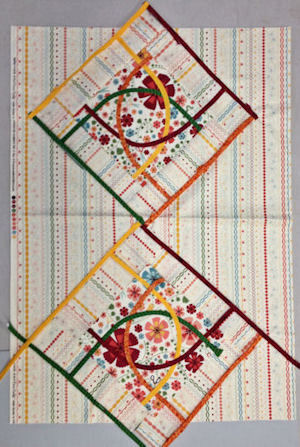
Joan's first layout of her patience puzzle blocks, with the frame bias matching the bias inside the blocks. She chose a stripe for one of her background fabrics
|

Joan rotated her blocks, which changed how the bias colors would line up.
She also planned to try a different fabric for the setting triangles, maybe the same fabric she used in the center squares.
|
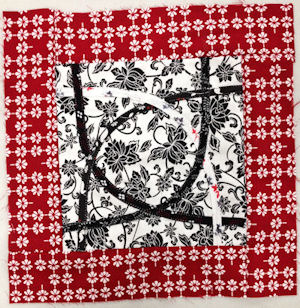
Laura made her blocks with a black, white and red colorway.
|

Karen's blocks on her background.
|

Laurie chose pastels for the rectangles framing her center square.
|
Glendale Quilt Guild of Glendale, CA - January 12, 2012 workshop

Colleen's tablerunner
|

Asian print tablerunner
|

Blue stripe tablerunner
|
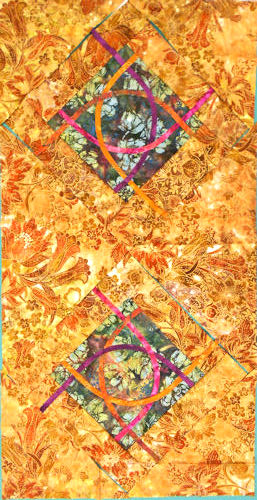
Batik tablerunner
|

Ann's Celtic Rose block. Ann took a workshop from Scarlett about 12 years ago and she made this block. She brought it to the Patience Puzzle workshop to share. Ann choose to work on the
Celtic Circuits center block design during class.
|

Orange stripe tablerunner
|
Chester Piecemakers of Chester, CA - August 7, 2011 workshop

Sports theme
|

Large scale print
|

Terry Back of Yuba City completed her tablerunner! 10-03-12
|

Here are six of the nine blocks made in this class. Some students are thinking of making three or more blocks with their chosen fabrics so that they will have a longer tablerunner.
Terry Back's block is on the lower left side and she has completed her tablerunner.
|

Dark background with bright colors
|

Here's the block from another student, with the setting triangles that will be used for the tablerunner when the second matching block is finished.
|
Here's some ideas for quilts that you can make using Patience Puzzle. Scarlett used EQ7 to design some quilt layouts for you. The fabrics are various types; prints, batiks, etc., from assorted manufacturers, since these quilts were designed with fabrics downloaded for EQ7.

OriginalEQ7 graphic of two blocks set on point.
|

Sample tablerunner made by Scarlett
|

A batik version - EQ7
|
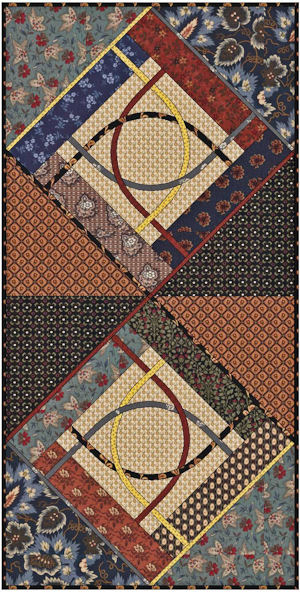
Reproduction fabrics, scrappy - EQ7
|
For a small project, Scarlett made two Patience Puzzle blocks, set them on point and added bias strips in the ditch, matching the bias' fabric colors. This small quilt or tablerunner measures 18" x 36".

Here's a 16 block layout of Patience Puzzle. If you twist and turn the blocks so that the colors of bias tape line up, you get an overall pattern of linked rings. This layout uses the 4 colors of bias as shown in 100 Blocks, but with two yellows/golds and two tans/browns. If you use only 4 fabrics for the outside strips around each block, then you'll also get a secondary pinwheel pattern in the patchwork.
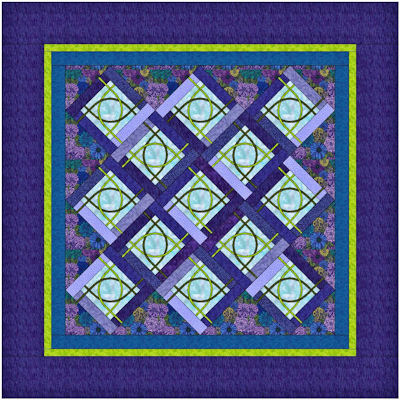
Here's an on point layout for Patience Puzzle. This EQ7 layout has 2 colors of bias, so it's easier to match up the blocks. The patchwork strips around the blocks were placed at random.
Return to Index










